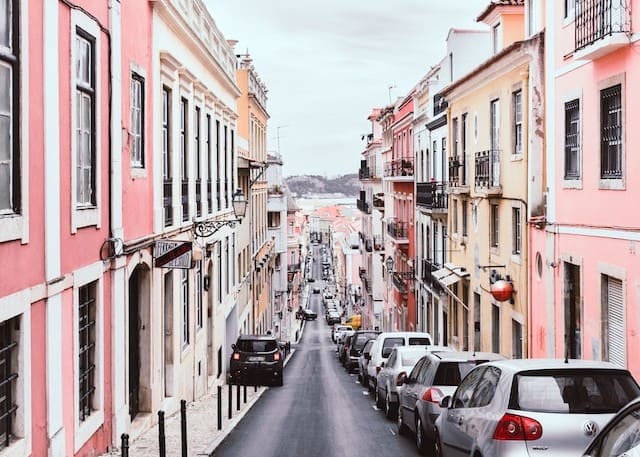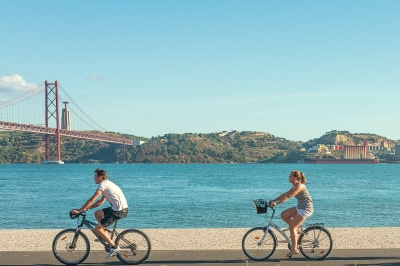Updated: April 23, 2024
Lisbon is a top choice for digital nomads, expats, and retirees looking to set up a new life. The warm weather, high quality of life, and old beauty of the city have attracted many foreigners from different walks of life to up sticks and move to Lisbon in the past years. So, if you are considering moving to Lisbon, then here’s what you should know!
As with any big decision like relocation, information is power, and we would always advise enlisting the help of trusted professionals to help you with moving to Lisbon. There are a few key things you should know before embarking on your journey of moving to Lisbon in 2024.
In this article, we’ll provide you with a solid foundation of information if you are considering moving to Lisbon. We know that the process of moving to any country can be pretty stressful, so here we provide you with some key information to make the process as easy as possible.
Why move to Lisbon?

For families, there are excellent schools in the center of the city and in the wider Lisbon area. Sintra and Cascais provide top locations for families to live, where you have excellent properties in stunning parts of the country while still being within striking distance of Lisbon.
With the beautiful Tagus River and the 25 de Abril Bridge (reminiscent of the Golden Gate Bridge and Oakland Bay Bridge, both of which can be found in San Fransisco, with the paint from the former and the design of the latter) stretched out before you, plus several miradouros (viewpoints) to admire the city from, you’ll quickly come to realize that there is nowhere quite like Lisbon.
From the winding streets of Alfama to the wide park of Eduardo VII, it is truly a special place to live. And don’t worry, you’ll soon get used to the hilly streets if you do choose to move to the city.
Portugal is also a very safe country, which is another key reason why expats from across the globe have their sights set on Portugal. Portugal ranked seventh in the 2023 Global Peace Index, which assesses countries level of peace and lack of. onfluct. When it comes to Lisbon, the city has a low crime, although when you are passing through busy tourist attractions and crowded spaces make sure you watch your belongings.
Moving to Lisbon? Here’s What You Should Consider
As with moving to any country, there are certain things that you’ll need to bear in mind. In this part of our article, we’ll provide you with some key essentials that you should bear in mind.
It can be hard to find a place
Lisbon is a hot real estate market, and therefore, finding a place that fits your requirements is no small feat. It’s also not easy to know whether the place you have chosen is priced correctly for the area, has a good value per square meter, and is in a safe and prosperous neighborhood.
There are hundreds and hundreds of properties out there in the Lisbon market, and looking online can seem like a minefield. This is where seeking expert advice comes in to help you effortlessly navigate Lisbon’s real estate market.
The local job market might not have the same salary standards as you’re used to
Portuguese salaries are considerably lower than those of the USA, the UK, and many other European countries.
Many expats move to Portugal and work remotely from their home country, which means their salary goes a lot further in a relatively cheap city to live in, like Lisbon – although prices are increasing. Many companies embracing remote work have furthered enhanced interest in expats moving to Portugal, as there is more flexibility with workers able to work from anywhere.
With this said Lisbon has become a tech capital in its own right, with many international startups and tech companies now calling Portugal home. This is exemplified by Web Summit, the largest tech festival in the world, which relocated to Lisbon in 2016. This new entrepreneurial buzz in the city brings with it many new opportunities for foreign residents looking for work in the city. There is now an abundance of world-class co-working spaces that can be found in Lisbon.
Cost of living in Lisbon
In Lisbon, you can eat and drink wonderfully at a relatively low cost. A beer costs less than a euro in a lot of places, and the same goes for coffee. Of course, there is an up-market dining scene, too, but the prices in these establishments are still low for the quality of the offerings you can have. Do bear in mind that in recent years, prices have been increasing quite rapidly.
Rents are high in Lisbon. If you are in a position to buy, you should. As with any hot property market and popular holiday destination, there are always benefits to buying rather than competing for rental property in the market with short-term holiday lets for tourists. The tourism boom in Lisbon shows no sign of slowing down and looks set to stay for many years to come.
Quality of life in Lisbon is fantastic

The Portuguese have a great appreciation for enjoying life. This could be stopping to enjoy a coffee and a pastry or a sun-drenched lunch to break up the working day, having lots of children running around a dining table in a taverna late at night, or sampling the excellent Port wine or deep reds from the Douro or Alentejo regions.
Be warned that their appreciation of life might be infectious. Head to Bairro Alto and downtown Lisbon to see the city come alive in the evenings.
Strong expat network
The expat community in Lisbon is warm and welcoming to newcomers. The growing group of foreigners in Lisbon is thriving and has further come to life following the trend of remote workers heading to the Portugeuse capital. There are regular meet-ups for expats and digital nomads that take place in various places across the city, making living abroad here very easy. Living in Lisbon, you should easily be able to form a strong network of friends quickly, with there being many activities to get involved in, from yoga to cooking classes and from golf to water sports activities.
Bureaucracy and dealing with language barriers
There is naturally a bit of bureaucracy to deal with when moving to Portugal, such as registering at the local town hall, getting a NIF (Portuguese tax number), and setting up a bank account.
However, the process can be slow. Making sure you have all the required documents with you will significantly speed up the process.
Living in Lisbon, you will find English widely spoken and the language barrier should not be much of a problem. Most locals will be able to assist you, with many even going out of their way to help you on your way, from providing you with restaurant recommendations to helping you with learning Portuguese.
Real Estate in Lisbon
The Lisbon property market has moved from strength to strength over the years, with expats heading to the Portuguese capital from across the globe.
In Lisbon city, the average asking price for property stood at €6,009 per square meter in 2023. If you look at Greater Lisbon, this is reduced to €4,061 per square meter. Note that the purchase piece can be higher or lower than the asking price, so keep this in mind when negotiating with the seller.
As you can see, in the capital itself, housing prices are much steeper than in the surrounding area. Even in Lisbon city itself, different neighborhoods have different price ranges, with the more expensive neighborhoods generally being those close to the city center. However, compared to other countries in Western Europe, you will still find them quite affordable.
The most attractive neighborhoods in the city will depend on your requirement and, above anything else, you will want to find the part of the city that you feel at home in. It can be worth renting a place and using this as a base to explore potential neighbohoods.
Our book, Your Expert Guide to Buying Property in Portugal, will arm you with an easy six-step guide to the buying process, the options to open a Portuguese bank account, where the best places to buy in the country are, plus key information on taxes, fees, and financing your property.
Finding Your Home in Lisbon: Working with a Realtor Versus a Buyer’s Agent

However, in Portugal, there is quite a significant conflict of interest when it comes to utilizing the services of realtors or real estate agents. The cons of using a realtor are based on the fact that a realtor is working for the seller of a property. This means that they are trying to sell you a particular property from their portfolio and may not give you a fully balanced and objective overview of the property as they will secure a higher commission for a higher sale.
Using a buyer’s agent adds a layer of impartiality to the process. Buyer agencies are licensed professionals, too, but work solely for the buyer of the property as their client. This means they are going to scan all opportunities, on and off-market, and prepare a curated selection of properties that will match your exact requirements.
Buyer’s agents also help with the negotiation process, can recommend reliable service providers (such as surveyors, financial advisors, etc.), and make a full-value property comparison with what is available in the area and what has been sold for similar prices in the vicinity.
Which part of Lisbon should I move to?
Yes, this can be the most difficult aspect of moving to any city, and Lisbon is no different. We recommend visiting Lisbon a few times to discover the different neighborhoods before settling on a particular part of the city.
You’ll quickly find that each neighborhood of the city has its own character, its own pros and cons, and one may be better suited to what you are after than another. You’ll find that most places are within walking distance, and there is a good metro and bus service in the city, plus train links to Cascais and the rest of the country.
If you are moving with a family, then a quieter neighborhood such as Campo do Ourique and Estrela, close to schools and with spacious properties, could be the best option. You can choose from public schools, private schools, and international schools in Lisbon, and there are excellent options from an early age up to further education levels.
If you are moving with a family, you will be pleased to know that most parts of the city have many green spaces – back in 2020, Lisbon was the winner of the European Green Capital Award.
For digital nomads and young people, perhaps somewhere a little livelier is up your street, such as Baixa or Anjos, and for older expats, if you are moving to retire, you’ll be looking for somewhere to unwind and relax in style. Estrela or Lapa could be good options, or Cascais, should you want to live a stone’s throw from the Atlantic Ocean.
If you are looking for key parts of the city to live in, you can see our article here: The Ultimate Guide to the Best Neighborhoods in Lisbon.
Greater Lisbon

The steady influx of people heading to the city means that almost 27 percent of Portugal’s population lives in the Lisbon Metropolitan Area. This area is more than five times as populous as its hub, with roughly three million inhabitants. The largest of these municipalities include Amadora, Cascais, Loures, Sintra, Seixal, and Almada.
Almada real estate can provide investors with an up-and-coming part of Portugal, with rental yields standing at 6.2 percent in 2o23. If you are looking for top locations outside of the hustle and bustle of central Lisbon, consider the surrounding areas.
Sintra

Situated in the National Park of Sintra and Cascais, if you are into the great outdoors, then you should definitely consider living here. Plus, with many stunning, quiet beaches hugging the coastline, you can enjoy the views of the Atlantic coast whenever it takes your fancy.
For families moving to Portugal, you should find some excellent international schools close by, and, given the natural beauty and climate in Portugal, you’ll be able to spend your weekends discovering the area and spending much-needed time with your family. An excellent international school very close to Sintra is the Carlucci American International School of Lisbon, which follows the American curriculum.
One of the best places to bring up a family, period, and, as you are just 30-40 minutes away from Lisbon, you have the best of both worlds – the buzzing city and the sublime countryside, with some beautiful beaches thrown in for good measure.
Cascais

Similar to Sintra, Cascais is also a very good area for families as there are excellent international schools close by. Examples include Park International School, St António International School, St John’s International School, and the International Christian School of Cascais.
If you are moving to Lisbon, you will also find that a little bit out of the city, you will benefit from more spacious properties. Many homes here will have a private swimming pool, security, or a private gym. The variety of property types on offer is another plus, with some incredible villas up for grabs and many apartments that would prove to be excellent investments.
Practical Information about Moving to Lisbon
In this section, we’ll provide you with some practical information about moving to Lisbon, which has quickly become one of the most popular European capital cities for expats.
 Shipping goods to Lisbon
Shipping goods to Lisbon
When considering international removal companies for your move to Lisbon, you will typically have two options, and you will want to consider the best option for you.
1. Full packing service by company employees
2. Packing goods yourself
Moving companies will usually provide the packing themselves, but it is best to double-check that this is the case. Also, be sure to ask about insurance, as some companies only insure belongings if they package them themselves.
You will also want to decide whether you want to opt for road freight, sea freight, or air freight, each of which will have its benefits and drawbacks, and bear in mind the customs costs and if there are any restrictions on the items you want to send to Portugal.
 Portuguese language
Portuguese language
While most locals will speak English in Lisbon, particularly the younger generation, it is a good idea to learn Portuguese when moving to Lisbon. It is always easier to integrate when you know the language, and the Portuguese usually go out of their way to assist you with the learning process. There are many language schools across the city, plus many language professionals that teach online or offer one-on-one lessons.
Note that you will likely need to speak Portuguese in government offices where English is not so widely spoken.
 Healthcare in Lisbon
Healthcare in Lisbon
Healthcare in Lisbon, as with the rest of Portugal, is largely very good and is also affordable. Residents have access to the public healthcare system, where only a minimal cost is required. And, should you opt for private healthcare, you will find that it is much more affordable when compared with the equivalent in the USA or other Western European countries. Private healthcare insurance in Portugal costs between €30 and €150 per month.
 Education in Lisbon
Education in Lisbon
If you are moving to Portugal with a family, you’ll be happy to know that there are 28 international schools in Lisbon and the Greater Lisbon area, offering a range of teaching styles, languages, and curricula.
Public education is free for Portugeuse residents, while private and international school fees will vary depending on the school. You should find that education in Portugal is quite affordable and generally very good. Universities in the Portuguese capital are also world-renowned, with many international students opting to study in Lisbon.
When moving to Portugal with family, it can be worth considering the school that you would like to send your child to. Consider Lisbon neighborhoods close to the international school or public school of your choice.
 Transportation in Lisbon
Transportation in Lisbon
In Lisbon, navigating the city is easy thanks to its efficient transport network, including a reliable metro service, trams, buses, and trains. Plus, it’s pretty easy to get around on foot, while taxis, Uber, and Bolt are also very cheap compared with other European capital cities.
The metro offers convenient connections throughout the city, while iconic trams wind through historic streets and are used by both locals and tourists. You also have buses that operate across the city and trains to get further afield.
For international travelers, Lisbon has its own international airport where you can travel across Europe, Africa, the Americas and beyond. If you book in advance, you will find cheap flights to beautiful European cities, perfect for a long weekend getaway.
 Emergency services in Lisbon
Emergency services in Lisbon
The Portuguese National Emergency Number is 112. For emergency health hospital care, contact the SNS Line 24 (808 24 24 24) or visit your local health center.
Living in Lisbon: Pros and Cons
On the whole, living in Lisbon has many pros than cons. While the pros are quite obvious, the bad things about living in Portugal may be more difficult to uncover.
Pros:
- A beautiful old city with plenty of things to see and do
- Good weather through most of the year
- Great fresh fish and seafood
- Thriving nightlife and social scene
- Low cost of living
- Warm and welcoming expat network
- Portuguese nationals are friendly and accommodating
- An array of beautiful beaches, such as Costa da Caparica and Carcavelos with opportunities to surf
- Good business opportunities
Cons:
- Rents can be high
- Bureaucracy can be slow and difficult to navigate alone
- Learning Portuguese can be difficult
- Some properties do not have central heating, so it can get cold in the winter months
- Hills and cobbled streets
- Overtourism in the summer months
- No central heating in many older properties
- Challenge to find a property to rent
Moving to Lisbon from the USA
If you are moving to Lisbon from the US, you’ll find that the cost of living, from daily essentials and transportation to healthcare and eating out in restaurants, is much more affordable than in the USA. You will likely be pleasantly surprised when comparing Lisbon to your own city or town in the US. Consumer prices are around 45 percent lower in Lisbon than in San Francisco.
If you are considering moving to Lisbon from America, you will need a residence visa. The two best Portuguese visas for Americans are the Golden Visa and the D7 Visa.
The Portugal Golden Visa is an excellent option whereby you can secure residency for a qualifying investment in the country through real estate, capital transfer, and many other options.
If you do not want to make a significant investment in the country, then the best option is the Portugal D7 Visa, whereby you will be able to stay in Portugal so long as you can prove that you can sustain yourself throughout your stay in the country. As a European city, Lisbon offers a rich history, buzzing city life, and a myriad of stunning landscapes.
For remote workers looking to relocate to Lisbon, then the Digial Nomad Visa is your best option.
Moving to Lisbon from the UK
In the same way, if you are moving from London to Lisbon, you will find that the city is very affordable. While rental prices and property prices are creeping up, they are still much more reasonable than in the capital of the UK. Moving to Lisbon from the UK, you should be pleasantly surprised by the cost of living in the Portuguese capital.
You will need to get a residency permit if you are looking to enter Portugal for more than 180 days. The most affordable option is the D7 Visa, although the Golden Visa is also an excellent option whereby you will need to make a qualifying investment in the country to secure residency. The Digial Nomad Visa is also a top option for UK citizens looking to work remotely from Portugal.
Note that for other non-EU citizens, you should check about the visa process in your country for entering Portugal. As with US and UK citizens, the Golden Visa, D7 Visa, and Digital Nomad Visa are good options to consider.
Moving to Lisbon from the EU
If you are moving to Lisbon as an EU citizen, you will find the process very easy. If you are staying more than 180 days, you will simply need to apply for a registration certificate. You can apply for this at your local Council within the 30 days following your first three months in Portuguese territory.
Get in Touch with Us
Goldcrest are property experts and can assist you in making the best investment decision for Lisbon real estate. As a property buyers agent based in Lisbon, we work solely on behalf of our clients. We have deep expertise in the Portuguese real estate market and will always act diligently on your behalf to negotiate the best possible deal for you.
Frequently Asked Questions about Moving to Lisbon:
What to know before moving to Lisbon?
The cost of living in Lisbon is generally low, although prices have been rising in recent years. Lisbon has a sublime climate, relaxed pace of life, and bustling tech scene, attracting expats from all walks of life. Note that salaries are quite low by Western European standards, so if you are considering moving to Lisbon, it may be better to work remotely for an international company.
Is moving to Lisbon a good idea?
Portugal is an amazing country to relocate to and living in Lisbon provides many advantages: A warm climate, the Atlantic Ocean and the Sintra mountains close by, and a relatively low cost of living. Healthcare and education are very good and residents are conveninetnly located to some of the best beaches in the country.
What tips should I know about moving to Lisbon?
Research neighborhoods carefully to ensure you move to a part of the city that feels right for you. It can be best to rent a place first and use this as a base to explore neighborhoods that fit your criteria. Also, join expat groups to get insights from fellow internationals who have made the same move as you, they will often have invaluable advice. Even though most locals will speak English, if you learn Portuguese you will find it easier to integrate into Portuguese life.
What are the pros and cons of living in Lisbon?
Pros of living in Lisbon include great weather, low costs of living, and the delicious affordable food you can eat. Cons include relatively low local salaries and the fact that rental costs can be high.
Is moving to Lisbon a good idea?
Moving to Lisbon, you will find that the city provides a high quality of life, good quality healthcare, and welcoming locals, amongst other benefits. Portuguese people, particularly the younger generations, speak very good English, so you should have no trouble settling into the country.
Is Lisbon a good place to live?
Lisbon is a sun-drenched capital, with a lively social scene. The city has a relaxed atmosphere, high quality of life, affordable prices, and is one of the safest cities in the world. Yes, Lisbon is a great location to live a great expat life in a vibrant, international city with a historic core.
Can American citizens move to Portugal?
Yes, American expats can move to Portugal and you should, for the most part, have no problems with Portuguese immigration or the visa process if you fulfill the requirements.
You will, however, need to acquire a residency permit to move to Portugal (staying more than 90 days in a 180 day period. The Portugal Golden Visa is an excellent option, whereby you can secure residency for a qualifying investment in the country. If you do not want to make a significant investment in the country, then the best option is the D7 Portuguese Visa, whereby you will be able to stay in Portugal, so long as you can prove that you can sustain yourself throughout your stay in the country.
With both visa types, as a resident of Portugal, you will have easy access to the European Union (EU) and can apply for Portuguese EU citizenship after five years through naturalization. For Portuguese citizens, there are an array of benefits including increased visa-free travel, the ability to live, work, and study in any EU country, and the ability to vote in local elections. One of the requirements set out by the Portuguese government to become a Portuguese citizen is that you will need to learn Portuguese, to a level of A2.
What is the process of moving to Lisbon from US?
Moving to Lisbon as an American, you will need to secure a residency permit. There are several options to consider, such as the Golden Visa, D7 Visa, and Digital Nomad Visa.
What is the process of moving to Lisbon from UK?
If you are considering relocating to Lisbon as a UK citizen, you will need to secure legal residency in the country, through the Portugal Golden Visa, D7 Visa, Digital Nomad Visa, or other visa options, including having a valid work permit or student visa.
Why is everyone moving to Lisbon?
Lisbon has become a magnet for people seeking a high quality of life at a lower cost compared to many other European capitals. Its stunning architecture, vibrant culture, excellent weather, proximity to stunning beaches and blossoming startup scene make it an attractive destination for digital nomads, retirees, and young professionals alike.
Is it a good idea to move to Lisbon?
Moving to Lisbon can be a fantastic idea for many reasons. With its rich history, welcoming locals, affordable cost of living, and thriving expat community, it offers a unique blend of traditional charm and modern amenities. With top international schools, a bustling tech scene, and excellent healthcare, the city appeals to expats from all walks of life.
Can an American move to Lisbon, Portugal?
Absolutely! Americans can move to Lisbon and enjoy all that the city has to offer. Portugal offers various visa options for Americans, including the D7 Visa, the Golden Visa, or the Digital Nomad Visa for freelancers.
How do I find accommodation in Lisbon?
Finding accommodation in Lisbon can be difficult as the city is one of Europe’s key touris desinations and has become increasingly popular with expats in recent years. However, with thorough research and working with experts in the field, you should be able to find a great property that meets your requirements. It’s also helpful to join expat groups, where fellow expats often share tips and listings. Be careful for scams, however, and make sure you check the property personally before making any payments.
What are the public transport options in Lisbon?
Lisbon has an excellent public transport system that covers the city, including buses, trams, metro, and trains, making it easy to navigate the city and its surroundings. The metro system is probably the quickest way to get from A to B and metro lines cover most of the city. You can also easily get to Cascais, a delightful seaside town by public transport from Lisbon. The train takes about an hour and you’ll pass by the beautiful Portuguese Riviera.
Is there a significant expat community in Lisbon?
Yes, Lisbon has a thriving expat community. Whether you are a retiree, digital nomad, or are moving to Portugal with family, you should be able to get to know fellow expats easily enough.

